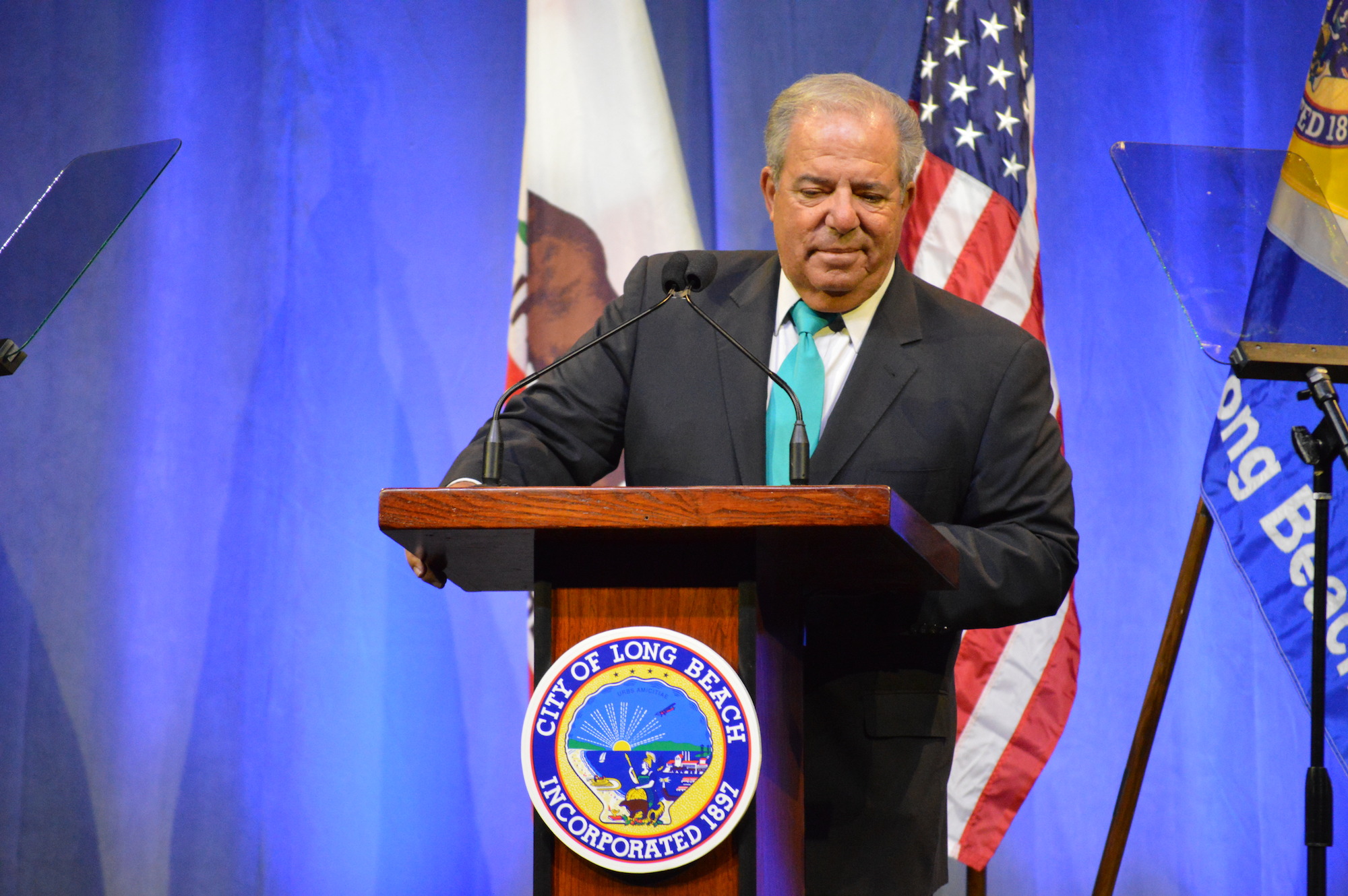
Mayor Bob Foster smiles at his family in the audience at the State of the City address Tuesday. Photos by Brian Addison.
Long Beach Mayor Bob Foster gave his last State of the City address to several hundred people at the Pacific Ballroom Tuesday night, reflecting on the City’s progress and accomplishments during his time as mayor, a job he said was “worth every minute.”
Foster’s introduction to the 45-minute speech was filled with some of his most poetic language to date, describing the past seven-and-a-half years as exhilarating, uplifting and “in truth, it has been at times exhausting.”
He went on to explain how he approached all the major decisions he faced as mayor: with the thought of a 10-year-old persistently in the back of his mind. For Foster, this concern for the future—“How will the City’s actions affect that child?”—defined his terms.
“The pressure to improve things today is immutable and constant,” Foster said. “As an elected official, there is not only the personal desire to deliver more services or benefits today, but also the public demand for things right now. The dilemma is truly confronted when the pressure of today could impair the future. Too often, that is how public policy is shaped: unsustainable public pensions are a great example of beggaring the future for benefits today; as are using one-time cash infusions to cover on-going costs; the elimination of Redevelopment, another.”
 Given these obstacles, Foster said he believes he has done his job of improving Long Beach for the future by ensuring we live within our means. This fiscal year brings the City’s first surplus in 10 years.
Given these obstacles, Foster said he believes he has done his job of improving Long Beach for the future by ensuring we live within our means. This fiscal year brings the City’s first surplus in 10 years.
Though many things contributed to this accomplishment, Foster specifically highlighted the money-saving effects of one of his most important legacy moments–pension reform.
“Perhaps the most important issue for our young people is the debt the City carries and its obligations in the form of unfunded or under-funded liabilities,” Foster said. “The single largest liability is our pension obligation. The pension spikes that occurred in 2002 carried with them devastating financial effects. The cost of the benefits given at that time is a staggering $375 million.”
According to Foster, these reforms will save the City some $250M over the next decade. Even further, the City’s unfunded pension liability has dropped in one year from $1.1B to $700M, attributed to what Foster called a combination of investment growth and reform.
Foster’s optimism for the future continued as he highlighted the City’s educational progress during his time in office, using as an example the ACE Academy at Jordan High School, a trade-style, four-year program which engages high school students in architecture, construction and engineering.
“Most of you know that I came out of a trades background. I worked my way through school as a carpet installer; a trade I learned from my father,” Foster said. “Perhaps nothing prepared me for a job in politics more than spending eight hours a day on my knees. What it did for me was give me a skill to use or fall back upon if other initiatives failed. Having a trade skill is a real advantage, especially for those young people who will not attend college.”
This was not left without its criticism on Twitter, as Long Beach librarian and youth advocate Francisco Vargas noted there was no mention in the speech of the positive changes made to the City’s robust library system.
@LongBeachPost can’t have strong education and innovation without strong libraries and schools
— Francisco (@lbclibrarian) January 15, 2014
Foster gave recognition to both the Long Beach Fire Department and the Long Beach Police Department, the latter of which logged in 2013 a 41-year low in violent crime despite the State’s controversial early release program for prisoners, which increased costs for local governments.
With 40 new police officers already graduated from the police academy and 28 new firefighters joining the ranks in 2013 alone, Foster hopes this continuing trend of a safer city continues.
The unwavering optimism that seemed to define Foster’s final State of the City took on a more serious tone only when he began discussing the Harbor Department. He praised the Port for its clean air plans and dedication to improving public health, but did not flinch in his disappointment with the Harbor Commission during the last year.
“For many years the Harbor Department was run as if it were not a department of the City. Its impact on the City was often an afterthought. This is an unhealthy situation,” Foster said, alluding to his November 2013 request, which was ultimately approved by city council, to remove former Harbor Commission President Thomas Fields. “…I’m confident that this Commission will pay closer attention to construction projects and provide greater harmony with City interests and continue to improve its financial discipline.”
In the end, Foster concluded that his dream—always creating opportunity for that nameless 10-year-old—is, ultimately, a collective job.
“If we preserve the fiscal structure and principles we have today, these changes will enhance the lives of our residents,” Foster said. “It’s no different in cities than in is in families. We live, plan, work, and educate to make things better for the next generation. To make the road a little wider and smoother for those follow us; to provide for a more productive, richer, fuller, and more rewarding life for the next generation.”
Read more:

